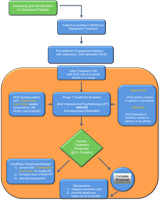Screening & Referral:
Pregnant women are screened on the PHQ-9, a validated depression-screening tool to determine if depressive symptoms are present. This occurs at one of the woman’s Maternity Support Services visits by her MSS social worker and takes less than 5 minutes.
Eligibility & Enrollment:
MOMCare was designed for and was tested in women with unipolar depression and is not an appropriate treatment for individuals with bipolar disorder, psychosis, substance abuse, multiple prior suicide attempts, or current domestic violence. If additional assessments determine that the MOMCare program is appropriate for a patient, then the depression care specialist and patient have an engagement interview, preferably face-to-face in the public health center, followed by sessions conducted in-person or by telephone.
Engagement Interview:
There are 5 main goals of this pre-treatment session:
- Listen to the patient’s story and how depression (or stress if that’s what she wants to call it) is interfering with what is important to her.
- Find out what she would want or not want if she were to seek depression care.
- Provide education about depression and options for treatment.
- Identify and problem-solve the patient’s practical, psychological, and cultural barriers to care.
- Elicit what the patient wants to do – it’s up to her!
Treatment Sessions:
The patient chooses one or both of two options for treatment:
- Brief Interpersonal Psychotherapy, an evidence-based treatment for depression (8 weekly treatment sessions)
- Antidepressant medications
 The first phase of treatment occurs over approximately eight weeks. The depression care specialist (DCS) contacts and reaches out to the patient every 1-2 weeks. At each session (in-person or by phone), the DCS administers the depression assessment (PHQ-9) to track the patient’s depressive symptoms. After approximately 6 weeks, the patient’s response to treatment is assessed. If the patient has a complete response to treatment, then she enters the maintenance phase (contact with the DCS every 2-4 weeks). If the patient does not have a complete response to treatment, then the MOMCare team suggests another course of action based on a stepped care model (e.g. switching to or adding another treatment modality, adjusting or augmenting medications, etc.) and the patient is assessed again after a four-week treatment period.
The first phase of treatment occurs over approximately eight weeks. The depression care specialist (DCS) contacts and reaches out to the patient every 1-2 weeks. At each session (in-person or by phone), the DCS administers the depression assessment (PHQ-9) to track the patient’s depressive symptoms. After approximately 6 weeks, the patient’s response to treatment is assessed. If the patient has a complete response to treatment, then she enters the maintenance phase (contact with the DCS every 2-4 weeks). If the patient does not have a complete response to treatment, then the MOMCare team suggests another course of action based on a stepped care model (e.g. switching to or adding another treatment modality, adjusting or augmenting medications, etc.) and the patient is assessed again after a four-week treatment period.
Maintenance and Follow-up:
Once the patient successfully responds to treatment, the MOMCare depression care specialist contacts her bi-weekly or monthly for another 3 to 6 months.

